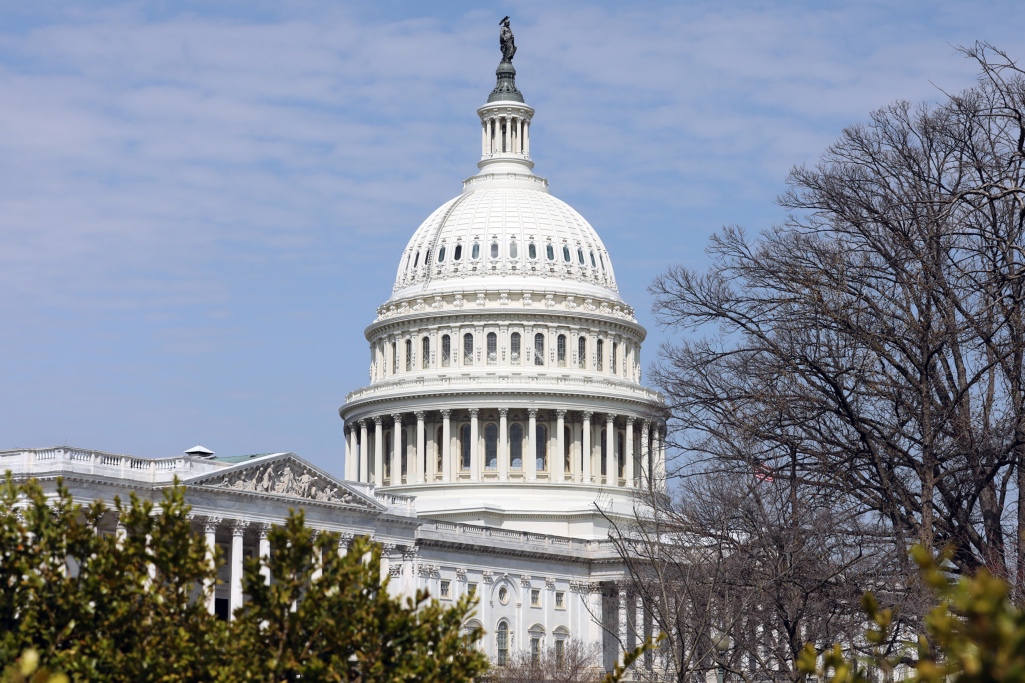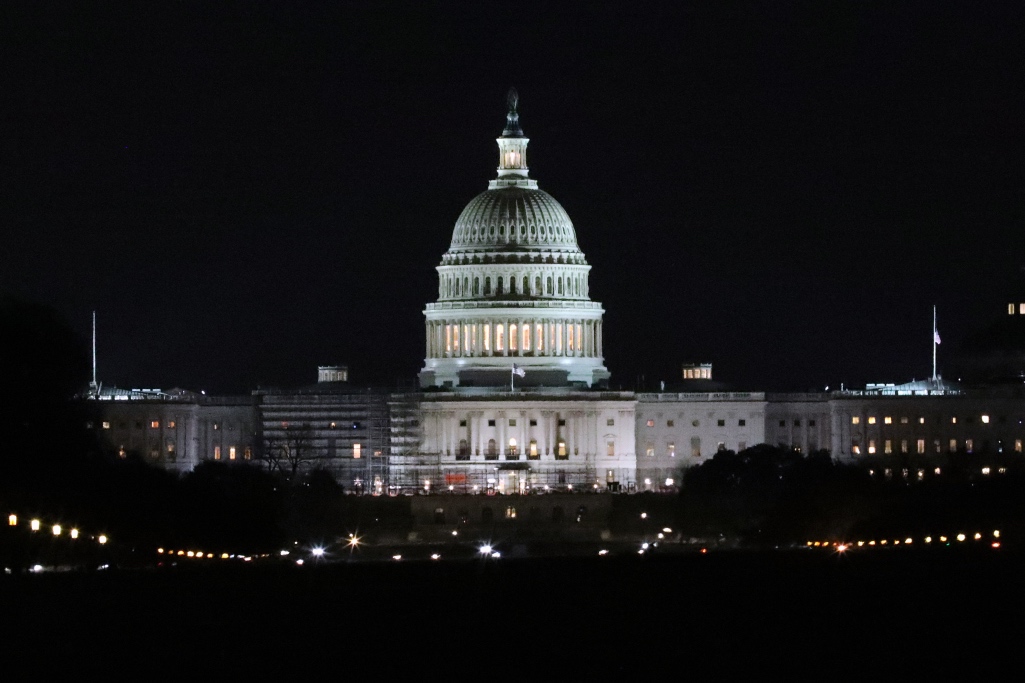
President Biden delivers remarks before signing the Respect for Marriage Act in a ceremony on the South Lawn of the White House.
WASHINGTON, D.C. – Same-sex marriage is now protected in federal law.
President Biden signed the Respect for Marriage Act (RMA) on Tuesday (Dec. 13) and thereby finalized landmark legislation that redefines the world’s oldest institution. Five days after Congress completed passage, Biden enacted a bill that mandates federal and state recognition of any same-sex marriage considered legal in the jurisdiction where it took place.
Although the new law does not require states to legalize gay marriage, it repeals the Defense of Marriage Act (DOMA). By enacting DOMA in 1996, the federal government defined marriage as only between a man and a woman and protected the right of a state not to recognize a same-sex marriage that occurred in another jurisdiction.
Concerns expressed by congressional Democrats that a more conservative U.S. Supreme Court might reverse its 2015 Obergefell v. Hodges decision that legalized gay marriage fueled the effort to enact the RMA. Congress gave final passage to the bill three weeks before control of the House of Representatives is to be transferred to the Republican Party.
The Southern Baptist Ethics & Religious Liberty Commission (ERLC) expressed disappointment at the enactment of a measure it and other opponents say not only contradicts the biblical view of marriage as only between a man and a woman but poses a threat to religious freedom.
ERLC President Brent Leatherwood told Baptist Press, “Since our work opposing this bill began in July, the ERLC has remained consistently clear: Marriage is an institution that cannot be defined by the government. God has intentionally established it as a life-long, covenantal union between one man and one woman for the purpose of human flourishing.
“Unfortunately, now that this act has become law, more people will be led astray and deceived by the false promises of the sexual revolution,” he said in written comments. “We are prepared to meet these challenges and continue our advocacy to ensure that people of faith are able to hold to their most fundamental beliefs about marriage and sexuality in the public square.”
Messengers to the SBC’s annual meetings have affirmed marriage as solely the union of a man and a woman in multiple resolutions across the years.
Before signing the bill, Biden told the audience gathered for the ceremony it comes on a day “America takes a vital step toward equality, toward liberty and justice not just for some but for everyone.” He described the enactment of the RMA as “a hard-fought victory generations in the making.”
The president also called for passage of the Equality Act, a far-reaching gay and transgender rights bill that critics warn would have catastrophic effects on religious freedom, as well as protections for women, girls and unborn children.
Before Biden spoke, British singer-songwriter Sam Smith and American singer-songwriter Cyndi Lauper each sang to a crowd on the South Lawn that the White House said was in the thousands.
The RMA gained final House passage in a 258-169 vote Dec. 8, with 39 Republicans joining all Democrats in support of the proposal. Ten days earlier, the Senate approved the same legislation in a 61-36 roll call that saw 12 GOP members voting with Democrats for the proposal.
The Senate approved before its final vote a substitute amendment to a version passed by the House in July. The Senate amendment included language attempting to address religious liberty concerns. Senate passage of the amended bill followed the defeat of three GOP-offered amendments intended to strengthen religious liberty protections.
Despite the revision, the ERLC and many other defenders of the biblical view of one-man/one-woman marriage and freedom of conscience remained opposed to the amended legislation approved by both houses and signed by Biden. They said the protections for religious freedom in the new law are insufficient, especially for conscientious objectors who provide services beyond the wedding context.
That RMA says nothing in the bill “shall be construed to diminish or abrogate a religious liberty or conscience protection” available to a person or organization under the U.S. Constitution or federal law. It also says nonprofit organizations, including churches, will not be required to provide services “for the solemnization or celebration of a marriage.”
In addition, the amended legislation clarifies the RMA does not “require or authorize” federal recognition of polygamous marriages.
In a section opposed by many religious liberty advocates, the bill authorizes a private individual, as well as the U.S. attorney general, to “bring a civil action” in federal court against a person who violates the measure.
Wedding vendors – including cake artists, florists, photographers and website designers – have been particularly vulnerable to government efforts to require them to provide their services for same-sex ceremonies. The Supreme Court heard oral arguments Dec. 5 in Lorie Smith’s challenge to a Colorado mandate that she design websites for gay weddings despite her objections as a Christian.
In letters in July and December, Leatherwood urged senators and House leaders, respectively, to oppose the bill.
While same-sex marriage is the focus of consideration regarding the RMA, the bill’s language prohibits denial of the recognition of marriage between two people on the basis of their “sex, race, ethnicity, or national origin.” The U.S. Supreme Court invalidated state bans on interracial marriage in its 1967 Loving v. Virginia decision.
In expressing its opposition, the Religious Freedom Institute (RFI) said the bill’s premise “that opposition to same-sex ‘marriage’ is akin to racism” is false and “profoundly disingenuous. There is no real or perceived threat to marriage based on race in any state in America.”
In addition to the ERLC and RFI, other organizations that remained opposed to the bill after it was amended included the U.S. Conference of Catholic Bishops, Alliance Defending Freedom, Ethics & Public Policy Center and Family Research Council.
Some faith-based proponents of traditional marriage and freedom of conscience expressed support for the changes in the bill regarding religious liberty. These included the National Association of Evangelicals, AND Campaign, The Church of Jesus Christ of Latter-day Saints, Council for Christian Colleges and Universities, Institutional Religious Freedom Alliance, Seventh-day Adventist Church and Union of Orthodox Jewish Congregations of America.
Democrats pushed for passage of the Respect for Marriage Act after the Supreme Court’s June reversal of Roe v. Wade, the 1973 opinion that legalized abortion nationwide. Supporters of same-sex marriage expressed concerns a future high court might also overturn the Obergefell decision and called for a legislative remedy to try to prevent such a ruling.
They cited a concurring opinion by Associate Justice Clarence Thomas in which he said the high court “should reconsider” all precedents similar to Roe. In the majority opinion, however, Associate Justice Samuel Alito denied the decision to overturn Roe would call into question the justices’ rulings in Obergefell and other cases.
President Clinton signed DOMA into law in 1996 after it gained passage overwhelmingly – 85-14 in the Senate and 342-67 in the House.
(EDITOR’S NOTE – Tom Strode is Washington bureau chief for Baptist Press.)


